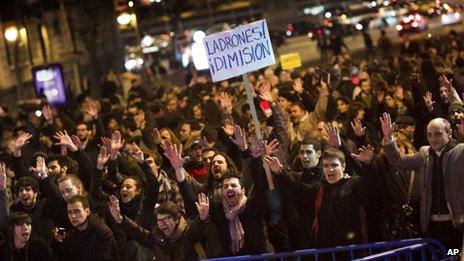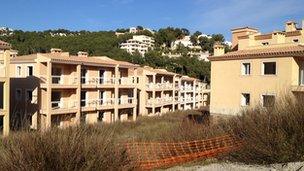Corruption casts shadow on Spain's Balearic islands
- Published

Many Spanish say they've had enough of the corruption cases whose names have become part of the national lexicon. "Thieves, resign!" this placard reads
Corruption has come to dominate the news in Spain. Scandals have engulfed the government and royal family. But the Balearic islands are under particular suspicion - linked to a third of the current scandals. The BBC's Tom Burridge in Palma investigates.
In the Santa Catalina market in a middle-class neighbourhood of Mallorca's capital, Palma, there is widespread scepticism over politics - and politicians.
"All of them," shout a chorus of women gathered around Julia Jimenez's butcher stall, when I ask how many politicians in Spain are corrupt.
It is a perception that is hard to shift, even if Transparency International rates Spain as relatively clean - the 30th least corrupt country, joint with Botswana, above Portugal and well above Italy.
Bernardo Contesti, 42, who owns a fourth-generation family-run fruit and veg business, believes corruption has been fuelled by the Spanish property boom and excesses of the past.
"Everyone seems to have some dirty laundry that needs cleaning," he sighs.

Greengrocer Bernardo Contesti says the taint of corruption spreads far and wide
Corruption and construction
One of the most famous scandals linked to the Balearic Islands is known as Palma Arena - a complicated web of investigations which have led to allegations against Inaki Urdangarin, the Duke of Palma and the Spanish king's son-in-law.
The accusation is that, through a "non-for-profit" company, he massively overcharged the regional governments of Valencia and the Balearic islands for organising sporting events.
He has not been charged with any criminal offence and denies any wrongdoing. However the investigations by state prosecutors are ongoing.
They will question the Duke of Palma in a closed court on Saturday as part of preliminary investigations.
Palma Arena is named after a velodrome, on the edge of Mallorca's capital, which was built at nearly three times the projected cost but was not built well enough to host professional cycling competitions.
Construction, which boomed massively in Spain until crashing in 2008, lies at the heart of most corruption cases, and the picturesque town of Andratx in Mallorca is a good (or bad) example.
Near the town's port, in a patch of beautiful countryside, are a set of ugly, half-built and unfinished apartment buildings.
Construction here was halted after local residents campaigned for the case to be taken to court.
The mayor at the time is now in prison, along with two other senior officials from his administration, for bending the rules and allowing property developers to build on protected land in return for kickbacks.
Short memory?
The curious thing about the Andratx case is that the conservative Popular Party, which was in power at the time, was subsequently re-elected in regional elections.
Past evidence suggests voters in Spain "have a limited memory of these events", says Cristina Manzano of the Spanish current affairs magazine Esglobal. She points out that the ruling Popular Party is currently under suspicion in a big national case.
But the next general elections are not until 2016, so the political impact might not be that great.

Building stopped on these buildings in Andratx after they were linked to corruption
Every corruption scandal in Spain has a name. Barcenas, Gurtel, Andratx, Palma Arena - just a few of the names that are part of the country's national discourse.
At the moment, there are about 300 current and former Spanish politicians being investigated for allegedly using their position of power for personal benefit.
Around a third of those politicians were, or are, in office in the Balearic Islands.
"There was a time when 10% of the regional parliament was implicated in different investigations into corruption cases," says Juan Carrau, a senior anti-corruption lawyer in Mallorca.
The building where he works has a plaque dedicated to its inauguration, bearing the name Jaume Matas - the former president of the regional government. Last year Matas was sentenced to nearly six years in prison for misusing public funds.
But Mr Carrau says more investigations and court cases do not necessarily mean that the system is more corrupt. It may just be better detection.
"It would have been unimaginable five years ago, that many of the cases that are now in the media would have gone to court."
For that reason, he is "relatively optimistic".
Institutional crisis?
But high-profile recent cases have reinforced the perception of corruption.
Besides the affair involving the king's son-in-law, there is also the Barcenas scandal.
The allegation is that the Popular Party's former treasurer, Luis Barcenas, wrote documents relating to a set of hidden or secret accounts which have appeared in El Pais newspaper.
The party and Prime Minister Mariano Rajoy, whose name appears in the documents, say the documents are false and their finances are clean.
The problem however, for both the Popular Party and the government, is that details dug up during preliminary judicial investigations in Spain, before a decision is made over whether a case can go to trial, are covered extensively in the media.
In national polls, the popularity of the government has been falling, but so too has that of the main opposition Socialist Party (PSOE).
But, as Prime Minister Rajoy recently pointed out, it has not stopped the Popular Party and the Socialists from dominating national and most regional elections.
As Ms Manzano from Esglobal argues, the construction boom might have led to more corruption, but strong political parties are "prone to nepotism", and a lack of accountability caused by a duplication of powers at central, regional and local government also played a part.
So far, the Barcenas scandal doesn't look like taking any big political scalps, but there are growing calls for institutional reform for the sake of the health of Spain's relatively young democracy.
- Published12 February 2013
- Published6 February 2013
- Published6 February 2013
- Published1 August 2013
- Published4 February 2013